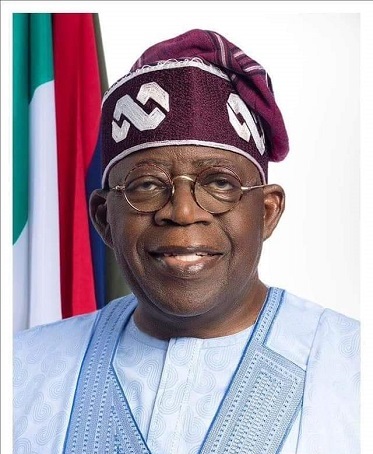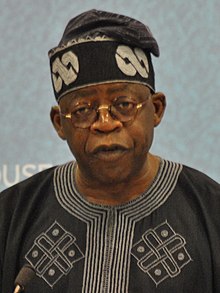Wikipedia Just Updated Tinubu’s Profile As President
Chief Bola Ahmed Adekunle Tinubu GCFR (born 29 March 1952) is a Nigerian politician who has served as the 16th and current president of Nigeria since 2023. He was the governor of Lagos State from 1999 to 2007; and senator for Lagos West in the Third Republic.
Never miss a story — subscribe to Lively Stones Relationship Blog PUSH NOTIFICATION for daily Post to stay up-to-date on the best of what LIVELY STONES has to offer, from juicy celebrity relationship news, romantic articles to compelling true life stories.
Tinubu spent his early life in southwestern Nigeria and later moved to the United States where he studied Accounting at Chicago State University. He returned to Nigeria in the early 1990s and was employed by Mobil Nigeria as an accountant, before entering politics as a Lagos West senatorial candidate in 1992 under the banner of the Social Democratic Party. After dictator Sani Abacha dissolved the Senate in 1993, Tinubu became an activist campaigning for the return of democracy as a part of the National Democratic Coalition movement.
In the first post-transition Lagos State gubernatorial election, Tinubu won by a wide margin as a member of the Alliance for Democracy. Four years later, he won re-election to a second term. After leaving office in 2007, he played a key role in the formation of the All Progressives Congress in 2013. In 2023, he was elected president of Nigeria.
Background
Early political career
2007 general election
In 2009, following the landslide victory of the People’s Democratic Party (PDP) in the April 2007 elections, Tinubu became involved in negotiations to bring together the fragmented opposition parties into a “mega-party” capable of challenging the then ruling PDP. In March 2009, there were reports that a plot had been identified to assassinate Tinubu. In February 2013, Tinubu was among several politicians who created a “mega opposition” party with the merger of Nigeria’s three biggest opposition parties – the Action Congress of Nigeria (ACN), the Congress for Progressive Change (CPC), the All Nigeria Peoples Party (ANPP), a faction of the All Progressives Grand Alliance (APGA) and the new PDP (nPDP), a faction of the then ruling People’s Democratic Party – into the All Progressives Congress (APC).
All Progressives Congress
In 2014, Tinubu supported former military head of state General Muhammadu Buhari, leader of the CPC faction of the APC – who commanded widespread following in Northern Nigeria, and had previously contested in the 2003, 2007 and 2011 presidential elections as the CPC presidential candidate. Tinubu initially wanted to become Buhari’s vice presidential candidate but later conceded for Yemi Osibanjo, his ally and former commissioner of justice. In 2015, Buhari rode the APC to victory, ending the 16-year rule of the PDP, and marking the first time an incumbent Nigerian president lost to an opposition candidate.
Tinubu went on to play an important role in the Buhari administration, supporting government policies and holding onto the internal party reins, in lieu of his long-held rumored presidential aspiration. In 2019, he supported Buhari’s re-election campaign defeating the PDP candidate Atiku Abubakar. In 2020, following an internal party crisis which led to the removal of Tinubu ally and party chairman Adams Oshiomole, it is believed the move was to scuttle Tinubu’s presidential prospects ahead of 2023.
2023 presidential election
On 10 January 2022, Tinubu made his formal announcement of candidacy for president.
On 8 June 2022, Tinubu won the party convention vote of the ruling APC, scoring 1,271, to defeat Vice President Yemi Osinbajo and Rotimi Amaechi who scored 235 and 316 respectively.
On 1 March 2023, INEC declared Tinubu winner of the 2023 presidential election. He was declared president-elect after he polled 8,794,726 votes to defeat his opponents. His runner-up Atiku Abubakar of the opposition People’s Democratic Party (PDP) polled 6,984,520 votes. Labour Party’s Peter Obi had 6,101,533 votes to come third.
Presidency (2023–present)
Tinubu constitutionally began his presidency on 29 May 2023. He is set to be sworn in as President of Nigeria by the Chief Justice of Nigeria Olukayode Ariwoola at 10AM (WAT) at an inauguration ceremony at Eagle Square in the Federal Capital Territory. His government having cleared the legal hurdles of the opposition following the March election is generally accepted unopposed and has international legitimacy. Several heads of state and government are scheduled to attend the swearing-in ceremony.Tinubu was conferred with the highest national honour of the Grand Commander of the Order of the Federal Republic by his predecessor Muhammadu Buhari, and his Vice President Kashim Shettima with the second highest honor of the Grand Commander of the Order of the Niger on May 25.
Ideology and public image
Tinubu has throughout his political career espoused a comprehensive political and economic platform. Tinubu’s ideal of progressivism include the values of egalitarianism, social justice, liberty, and the recognition of fundamental rights. He views the state as a positive advocate for the public welfare and its intervention in Nigerian society as necessary to ensure equality, justice, and social harmony. This ideal is not so far removed from his activism of democracy during the military dictatorship in Nigeria. His presidency is deftly expected to be a politico-ideological departure from Buharism, albiet, most international economists are yet to ascertain the nature of this departure in economic terms. The World Bank and IMF have pointed out the poignancy of the moment for the incoming government to establish macro-structural adjustments on the scale of the late 1980s reform to re-herald the Nigerian economy amidst a global slowdown.
The Lion of Bourdillon
Tinubu has been widely perceived as the “Godfather of Lagos”.His role in pulling the strings of the mega city-state was exposed in The Lion of Bourdillon, a 2015 documentary film highlighting Tinubu’s political and financial grip on the city-state. Tinubu filed a ₦150 billion libel suit against the producers, Africa Independent Television (AIT). The documentary ceased airing on 6 March 2015. He has attempted to strongarm the political process, including in December 2009, when it was reported that Fashola and Tinubu had fallen out over the issue of Fashola’s re-election as Governor of Lagos in 2011, with Tinubu preferring the commissioner for environment, Muiz Banire. A similar conflict took place in 2015 over Fashola’s successor, Akinwunmi Ambode, pitting Fashola against Tinubu, who threw his full weight behind Ambode. Ambode succeeded Fashola, was ousted by Tinubu and replaced by incumbent Babajide Sanwo-Olu.
Allegations of corruption
In 1993, his assets were frozen by the United States government as a result of a court case asserting that the American government had “probable cause” to believe Tinubu’s American bank accounts held the proceeds of heroin dealing. He settled with the U.S. government and forfeited about $460,000 later that year. Court documents and later reporting on the case suggested he worked in league with two Chicago heroin dealers.
In April 2007, after the general elections, but before the governor-elect Babatunde Fashola had taken office, the Federal Government brought Tinubu before the Code of Conduct Bureau for trial over the alleged illegal operation of 16 separate foreign accounts.
In January 2009, the Economic and Financial Crimes Commission cleared Tinubu and governors James Ibori of Delta State and Obong Victor Attah of Akwa Ibom State of charges of conspiracy, money laundering, abuse of office and official corruption in relation to a sale of Vmobile network shares in 2004. In September 2009, there were reports that the British Metropolitan Police were investigating a transaction in which the Lagos State government made an investment in Econet (now Airtel). Tinubu said the transaction was straightforward and profitable to the state, with no intermediaries involved. The Federal Government rejected a request by Britain to release evidence needed for further investigation and prosecution of the three Nigerian ex-governors in a London court.
During the 2019 election, a bullion van was seen entering Tinubu’s residence on Bourdillion Road in Ikoyi, which caused him to later exclaim: “I keep money anywhere I want.”
Personal life
Tinubu married Oluremi Tinubu, who is the current senator representing the Lagos Central senatorial district, in 1987. They have 3 children, Zainab Abisola Tinubu, Habibat Tinubu and Olayinka Tinubu.He fathered 3 children from previous relationships, Kazeem Olajide Tinubu (12 October 1974 – 31 October 2017), Folashade Tinubu (born 17 June 1976) and Oluwaseyi Tinubu (born 13 October 1985), whose mother is rumoured to be the former air hostess and prophetess Bunmi Oshonike.
Tinubu’s mother, Abibatu Mogaji, died on 15 June 2013 at the age of 96. On 31 October 2017, his son, Jide Tinubu, died in London. Tinubu is a Muslim.
Honours and decorations
National honours
Traditional titles
Tinubu holds two traditional chieftaincies; he is the “Asiwaju” of Lagos and the “Jagaba” of the Borgu Emirate in Niger State.
Original
For more Lively Stones Relationship Blog Stories and articles, make sure to subscribe to our PUSH Notification
Share this




